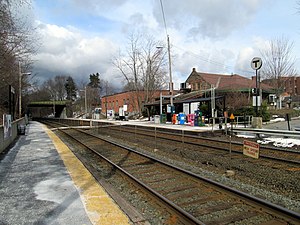Wellesley Hills (MBTA station)
|
WELLESLEY HILLS
|
||||||||||||||||||||||||||
|---|---|---|---|---|---|---|---|---|---|---|---|---|---|---|---|---|---|---|---|---|---|---|---|---|---|---|

Wellesley Hills station platforms; station building is at right
|
||||||||||||||||||||||||||
| Location | 339 Washington Street Wellesley, Massachusetts |
|||||||||||||||||||||||||
| Coordinates | 42°18′37″N 71°16′37″W / 42.3102°N 71.2770°WCoordinates: 42°18′37″N 71°16′37″W / 42.3102°N 71.2770°W | |||||||||||||||||||||||||
| Owned by | MBTA | |||||||||||||||||||||||||
| Line(s) | ||||||||||||||||||||||||||
| Platforms | 2 side platforms | |||||||||||||||||||||||||
| Tracks | 2 | |||||||||||||||||||||||||
| Construction | ||||||||||||||||||||||||||
| Parking | 51 spaces ($4.50 fee) | |||||||||||||||||||||||||
| Other information | ||||||||||||||||||||||||||
| Fare zone | 3 | |||||||||||||||||||||||||
| History | ||||||||||||||||||||||||||
| Opened | 1834 | |||||||||||||||||||||||||
| Rebuilt | March 13, 1886 | |||||||||||||||||||||||||
| Services | ||||||||||||||||||||||||||
|
||||||||||||||||||||||||||
Wellesley Hills is a commuter rail station on the MBTA Commuter Rail Framingham/Worcester Line, located off Washington Street (MA-16) in Wellesley, Massachusetts. Designed in 1885 and completed in 1886, the station was the last of nine stations that H.H. Richardson designed for the Boston and Albany Railroad. It replaced a previous station, built in 1834 with the completion of the Boston and Worcester Railroad.
Wellesley Hills has two low platforms serving the line's two tracks; it is not handicapped accessible.
The Boston & Worcester Railroad (B&W), extending outwards from Boston, reached through the West Parish of Needham in mid-1834.North Needham station was the terminus for a few months while construction continued towards Worcester. In 1839, the line was double tracked through the area.
The station was later renamed Grantvile, then briefly Nehoiden, and finally Wellesley Hills in 1881 when the West Parish was fully separated from Needham as the town of Wellesley.
Wellesley Hills station was designed by Henry Hobson Richardson in 1885 for the Boston & Albany Railroad, and was the last in a series of stations he designed, all featuring rough-cut light colored stone with dark stone trim around windows and doors, slate roofs, and varying amounts of decorative dark stone carvings. As a B&A station, it originally served both commuter trains in the Boston Metropolitan Area and long distance trains toward Albany, New York.
...
Wikipedia
